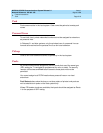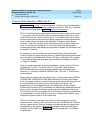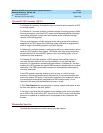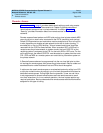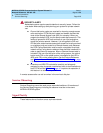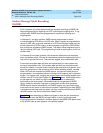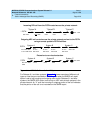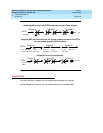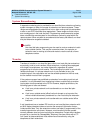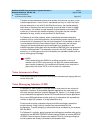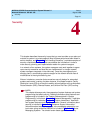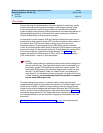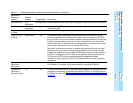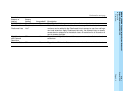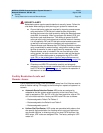
MERLIN LEGEND Communications System Release 6.1
Network Reference
555-661-150
Issue 1
August 1998
Feature Interactions
Page 3-26System Renumbering
3
System Renumbering 3
A separate numbering plan is provided for non-local dial plan extensions, allowing
system managers to enter the ranges of extensions on remote systems. These
ranges are associated with patterns that in turn allow routing over private tandem
trunks or over PSTN facilities when appropriate. These ranges must be unique
and unambiguous in the local dial plan. Programming remote extension ranges
does not affect the remote system or the extension numbering used within the
remote system. When a system is renumbered to the factory-set default, non-local
dial plan extension ranges are deleted.
NOTE:
Non-local dial plan programming can be used to route an extension’s calls
to an outside number. This may be convenient when, for example, an
extension user is working at home and wants to receive calls at a home
telephone number.
Transfer 3
Transfers of outside or non-local dial plan calls to non-local dial plan extensions
are actually trunk-to-trunk transfers. Most extensions, including those equipped
with single-line telephones, can make these calls, regardless of system
programming for trunk-to-trunk transfer. The incoming call must be on a trunk with
reliable disconnect. If a private network trunk is not available to carry the
transferring call, the consultation call can be callback-queued on the first route,
but the transfer must still be in progress.
If the system manager has prohibited an extension from making trunk-to-trunk
transfers, it is still prevented from transferring inside or outside calls to another
local system trunk connected to the PSTN. However, despite prohibitions, the
following types of calls are allowed:
■ A call on a private network trunk transferred to a non-local dial plan
extension
■ A call on an outside central office line/trunk (except on a loop-start line
without reliable disconnect) transferred to a non-local dial plan extension
■ A call on a private network trunk transferred to an outside central office
line/trunk
A call transferred over a tandem PRI trunk to a non-local dial plan extension with
an MLX display telephone does not receive the same call information that an
inside transfer does. Only the extension number and label (if programmed) of the
transferring extension are shown. However, most transfer functions operate
normally between local and non-local dial plan extensions. Except when transfers
are sent by or received by PassageWay Telephony Services clients with a CTI
link. Users at these extensions must make manual transfers by using the
telephones at their extensions.



